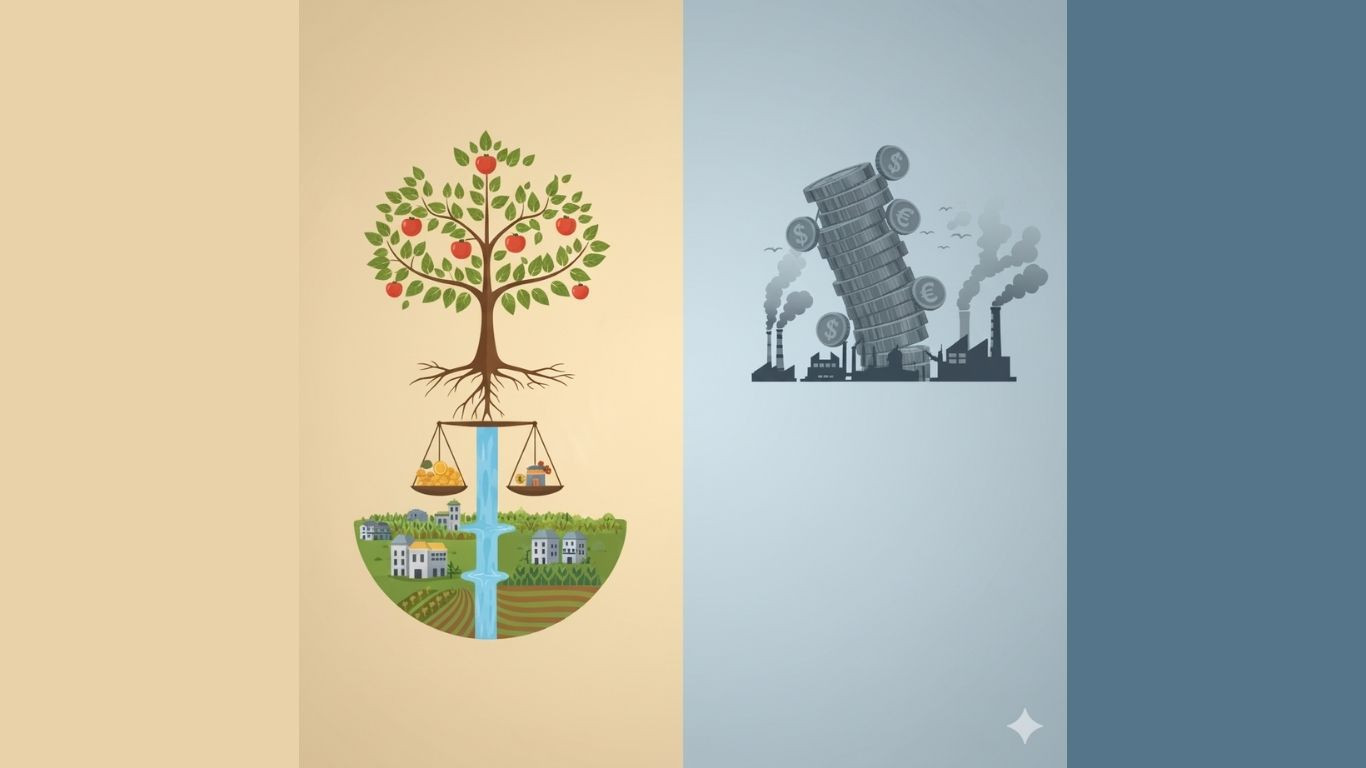
Islamic Economics is a moral, value-based economic system derived from the Qur’an, Sunnah, and the principles of Shariah (Islamic law). Its ultimate goal is to ensure justice, social welfare, and spiritual accountability in all economic activities. Economic activities must align with only Allah’s guidance and moral accountability. Wealth and resources must be fairly distributed. Charging or paying interest is strictly prohibited; wealth should not grow unjustly. Contracts like Mudarabah and Musharakah require mutual consent and risk-sharing. Transactions involving excessive uncertainty (gharar) or gambling (maysir) are banned. All trade and finance must involve tangible, productive assets having no speculative or fictitious wealth. Economic success is not personal gain alone, but also supporting the needy and maintaining balance. Wealth must not remain concentrated in the hands of the rich (Qur’an 59:7).
Islamic economics provides a just and ethical framework for revenue generation based on the principles of Shariah. Unlike conventional systems that rely heavily on taxation and interest-based borrowing, Islamic economics emphasises voluntary and obligatory contributions that promote social welfare and economic justice.
The primary revenue tools include Zakat, a mandatory alms-giving system levied on wealth, income, and agricultural production, which is used to support the poor and needy. Ushr is a type of agricultural tax, collected as a percentage of crop yield, and Kharaj is a land tax applicable to non-Muslim landowners under Islamic governance. Another important tool is Waqf (endowment), where assets are donated permanently for public benefit, such as education, healthcare, or infrastructure. Jizya, a minimal tax on non-Muslim citizens, ensures their protection and exemption from military service. Islamic states may also earn revenue from Fai (peaceful gains) and Ghanimah (war spoils), which are distributed fairly among the state and community. These tools ensure that wealth circulates justly, reduce poverty, and eliminate dependence on exploitative taxes or interest-based public debt. Together, they form a balanced, moral alternative to conventional revenue systems.
Islamic Economics presents a balanced, ethical, and sustainable model that contrasts sharply with the exploitative, inequality-prone conventional interest-based system. It uses divine guidance to eliminate riba, ensure social justice, and secure real economic welfare through tools like zakat, waqf, and profit-sharing, not through burdensome taxes or inflation-driven borrowing. In a world battling debt, inequality, and moral decay, the revival of Islamic economic principles offers not just financial stability, but economic dignity.
Conventional (interest-based) economics, despite its focus on growth and industrial progress, has largely failed to deliver equitable development across societies. Rooted in capitalism and profit maximisation, this system prioritises market efficiency over social justice, often resulting in widening income inequality. Wealth becomes concentrated in the hands of a few, while large segments of the population remain marginalised. Tools like interest-based lending, regressive taxation (e.g., VAT), and privatisation of essential services further deepen the divide between rich and poor. Moreover, reliance on GDP as the sole indicator of development ignores health, education, and social well-being.
Developing countries, burdened by external debts and conditional loans from institutions like the IMF and World Bank, face austerity measures that cut social spending and hinder poverty alleviation. The environmental degradation caused by unchecked industrial expansion adds to the long-term vulnerability of the poor. In essence, conventional economics promotes growth without fairness, leading to material progress for a few but social and economic exclusion for many — ultimately failing to achieve true equitable development.
The current global financial order, rooted in interest-based banking, has trapped nations and individuals in a vicious cycle of debt, inequality, and exploitation. At the heart of this system lies the creation of money through interest-bearing loans, where central and commercial banks generate money not backed by real assets, but by credit. This leads to an ever-increasing demand for repayment with interest, even though the money to pay that interest does not exist in circulation, pushing borrowers deeper into debt.
Households and businesses, meanwhile, face a lifetime of repayments on mortgages, student loans, and credit cards, creating a society driven by consumption and financial anxiety. This system fosters wealth concentration, where the rich, as lenders, grow richer, and the poor, as borrowers, grow poorer. Governments also fall into this trap, borrowing to fund deficits, only to allocate more national budgets to debt servicing rather than health, education, or infrastructure. The result is a self-reinforcing loop where real economic productivity declines, social unrest increases, and global inequality widen — all sustained by an artificial, unstable banking mechanism that benefits the few at the cost of the many.
______________________________________
The writer is a banker. He can be reached at [email protected]

